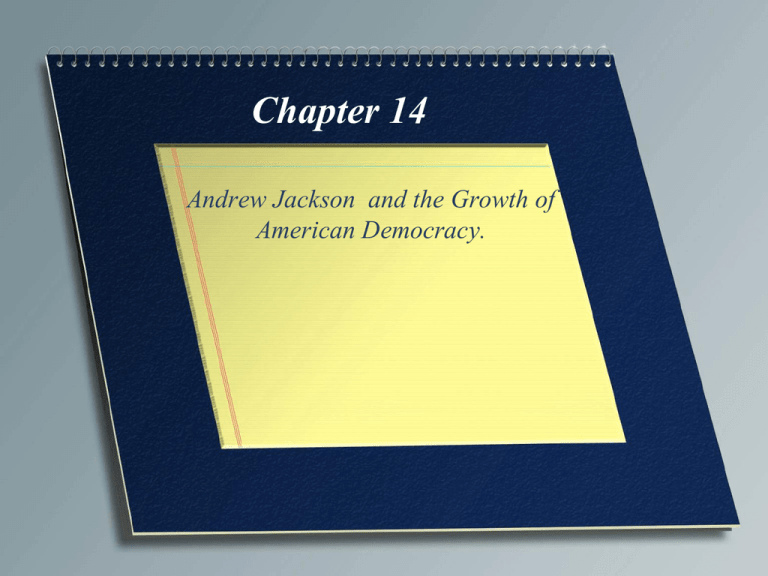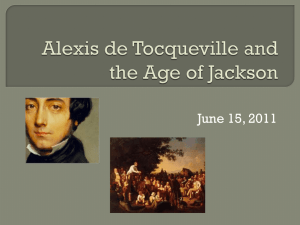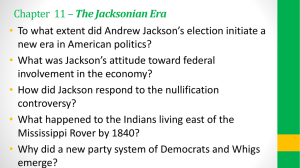SCRIBBLE PAD
advertisement

Chapter 14 Andrew Jackson and the Growth of American Democracy. 14.2 The Inauguration of Andrew Jackson • Write a paragraph summary of this section that includes these terms: • • • • Democracy Common People Vote Rich and Well-Born • 4 points 14.2 The Inauguration of Andrew Jackson When and Where: During the election of 1828, the United States 14.2 The Inauguration of Andrew Jackson • During the election of 1828, the United States experienced a growth in democracy. 14.2 The Inauguration of Andrew Jackson • During the election of 1828, the united states experienced a growth in democracy. Common people were being allowed to vote for the first time. 14.2 The Inauguration of Andrew Jackson • During the election of 1828, the united states experienced a growth in democracy. Common people were being allowed to vote for the first time. Before this, only the rich and well born could vote. 14.2 The Inauguration of Andrew Jackson • During the election of 1828, the united states experienced a growth in democracy. Common people were being allowed to vote for the first time. Before this, only the rich and well born could vote. Jackson was the champion of the common people but the rich and well-born were not so sure Jackson was the best person. • 2 points 14.2 The Inauguration of Andrew Jackson 14.2 The Inauguration of Andrew Jackson Is he the best the country has to offer? 14.2 The Inauguration of Andrew Jackson 14.2 The Inauguration of Andrew Jackson 1 point for both Finally, one of us! 14.3 From the Frontier to the White House • Write a paragraph summary of this section that includes these terms: • • • • Battle of New Orleans Democratic Party Corrupt bargain Self-made man • 4 points 14.3 From the Frontier to the White House Who & What Andrew Jackson grew up in poverty. 14.3 From the Frontier to the White House Andrew Jackson grew up in poverty. He was a self-made man. He became a lawyer, then a planter, then a military hero, and, finally, the president of the United States. 14.3 From the Frontier to the White House Andrew Jackson grew up in poverty. He was a self-made man. He became a lawyer, then a planter, then a military hero, and, finally, the president of the United States. Jackson was well known for his victory in the Battle of New Orleans. 14.3 From the Frontier to the White House Andrew Jackson grew up in poverty. He was a self-made man. He became a lawyer, then a planter, then a military hero, and, finally, the president of the United States. Jackson was well known for his victory in the Battle of New Orleans. Jackson lost the election of 1824 in the so-called “corrupt bargain” when 14.3 From the Frontier to the White House Andrew Jackson grew up in poverty. He was a self-made man. He became a lawyer, then a planter, then a military hero, and, finally, the president of the United States. Jackson was well known for his victory in the Battle of New Orleans. Jackson lost the election of 1824 in the so-called “corrupt bargain” when Henry Clay was accused of trading his support from Jackson to Adams for a job as secretary of state. 14.3 From the Frontier to the White House Andrew Jackson grew up in poverty. He was a self-made man. He became a lawyer, then a planter, then a military hero, and, finally, the president of the United States. Jackson was well known for his victory in the Battle of New Orleans. Jackson lost the election of 1824in the so-called “corrupt bargain” when Henry Clay was accused of trading his support from Jackson to Adams for a job as secretary of state. Jackson’s supporters founded a new Democratic Party to represent the common people. 14.3 From the Frontier to the White House 2 points Andrew Jackson grew up in poverty. He was a self-made man. He became a lawyer, then a planter, then a military hero, and, finally, the president of the United States. Jackson was well known for his victory in the Battle of New Orleans. Jackson lost the election of 1824in the so-called “corrupt bargain” when Henry Clay was accused of trading his support from Jackson to Adams for a job as secretary of state. Jackson’s supporters founded a new Democratic Party to represent the common people. In 1828, Jackson was elected President. 14.3 From Frontier to the White House 14.3 From Frontier to the White House We may be in for it now! 14.3 From Frontier to the White House 14.3 From Frontier to the White House 1 point for both They can’t steal every election! 14.4 Jackson’s Approach to Governing • Write a paragraph summary of this section that includes these terms: • Kitchen Cabinet • Spoils System • Civil Servant • 3 points 14.4 Jackson’s Approach to Governing Who and What Jackson’s approach to governing was controversial 14.4 Jackson’s Approach to Governing Jackson’s approach to governing was controversial. He relied more on his friends in the "kitchen cabinet” than he did on the regular cabinet. He also tried to reform the government. He believed 14.4 Jackson’s Approach to Governing Jackson’s approach to governing was controversial. He relied more on his friends in the "kitchen cabinet” than he did on the regular cabinet. He also tried to reform the government. He believed that government workers should “go back to making a living as other people do.” He replaced about 10% of civil servants. 14.4 Jackson’s Approach to Governing 2 points Jackson’s approach to governing was controversial. He relied more on his friends in the "kitchen cabinet” than he did on the regular cabinet. He also tried to reform the government. He believed that government workers should “go back to making a living as other people do.” He replaced about 10% of civil servants. Jackson rewarded his followers in the Democratic Party with government jobs. His opponents called this the “spoils system,” from the saying “ to the victor belong the spoils of war.” 14.4 Jackson’s Approach to Governing 14.4 Jackson’s Approach to Governing Jackson has too much power. 14.4 Jackson’s Approach to Governing 14.4 Jackson’s Approach to Governing 1 point for both Finally. Someone is throwing the bums out. 14.5 The Nullification Crisis • Write a paragraph summary of this section that includes these terms: • • • • Tariffs States’ rights South Carolina John C. Calhoun • 4 points 14.5 The Nullification Crisis What and why? Tariffs were a source unhappiness and hardship in some states and a source of joy in others. 14.5 The Nullification Crisis Tariffs were a source unhappiness and hardship in some states and a source of joy in others. Southern states suffered because of tariffs. When a high tariff passed in 1828 citizens in 14.5 The Nullification Crisis Tariffs were a source unhappiness and hardship in some states and a source of joy in others. Southern states suffered because of tariffs. When a high tariff passed in 1828 citizens in South Carolina were outraged. They believed the federal government had gone too far, and threatened to secede. 14.5 The Nullification Crisis Tariffs were a source unhappiness and hardship in some states and a source of joy in others. Southern states suffered because of tariffs. When a high tariff passed in 1828 citizens in South Carolina were outraged. They believed the federal government had gone too far, and threatened to secede. John C. Calhoun was a champion of South Carolina’s 14.5 The Nullification Crisis Tariffs were a source unhappiness and hardship in some states and a source of joy in others. Southern states suffered because of tariffs. When a high tariff passed in 1828 citizens in South Carolina were outraged. They believed the federal government had gone too far, and threatened to secede. John C. Calhoun was a champion of South Carolina’s States’ rights. He tried 14.5 The Nullification Crisis Tariffs were a source unhappiness and hardship in some states and a source or joy in others. Southern states suffered because of tariffs. When a high tariff passed in 1828 citizens in South Carolina were outraged. They believed the federal government had gone too far, and threatened to secede. John C. Calhoun was a champion of South Carolina’s States’ rights. He tried to have tariffs repealed, and argued in favor of nullification. 14.5 The Nullification Crisis 2 points Tariffs were a source unhappiness and hardship in some states and a source or joy in others. Southern states suffered because of tariffs. When a high tariff passed in 1828 citizens in South Carolina were outraged. They believed the federal government had gone too far, and threatened to secede. John C. Calhoun was a champion of South Carolina’s States’ rights. He tried to have tariffs repealed, and argued in favor of nullification. Jackson threatened to send in federal troops, and the crisis ended. 14.5 The Nullification Crisis 14.5 The Nullification Crisis 1 point The Feds can’t do that. The states have rights! 14.6 Jackson Battles the Bank of the United States • Write a paragraph summary of this section that includes these terms: • • • • Nicholas Biddle Henry Clay Farmers Bank of the United States • 4 points 14.6 Jackson Battles the Bank of the United States What and why? The Bank of the United States was a controversial during Jackson’s time. 14.6 Jackson Battles the Bank of the United States The Bank of the United States was a controversial during Jackson’s time. Jackson thought that the Bank only served the rich. The Banks’ director, 14.6 Jackson Battles the Bank of the United States The Bank of the United States was a controversial during Jackson’s time. Jackson thought that the Bank only served the rich. The Banks’ director, Nicholas Biddle, represented everything that Jackson hated. He was rich and wellborn. 14.6 Jackson Battles the Bank of the United States The Bank of the United States was a controversial during Jackson’s time. Jackson thought that the Bank only served the rich. The Banks’ director, Nicholas Biddle, represented everything that Jackson hated. He was rich and wellborn. The government had large deposits in the bank. Jacksons political opponent, 14.6 Jackson Battles the Bank of the United States The Bank of the United States was a controversial during Jackson’s time. Jackson thought that the Bank only served the rich. The Banks’ director, Nicholas Biddle, represented everything that Jackson hated. He was rich and wellborn. The government had large deposits in the bank. Jacksons political opponent, Henry Clay, tried to use the Bank controversy to defeat Jackson in 1832. 14.6 Jackson Battles the Bank of the United States 2 points The Bank of the United States was a controversial during Jackson’s time. Jackson thought that the Bank only served the rich. The Banks’ director, Nicholas Biddle, represented everything that Jackson hated. He was rich and well-born. The government had large deposits in the bank. Jacksons political opponent, Henry Clay, tried to use the Bank controversy to defeat Jackson in 1832. With the support of poor farmers, Jackson defeated Clay and killed the bank. 14.6 Jackson Battles the Bank of the United States 14.6 Jackson Battles the Bank of the United States Jackson's Cracked! The Bank makes our country strong. 14.6 Jackson Battles the Bank of the United States 14.6 Jackson Battles the Bank of the United States 1 point for both Andy’s right. The Bank has to go. 14.7 Jackson's Indian Policy • Write a paragraph summary of this section that includes these terms: • Cherokees • Black Hawk • Trail of Tears • 3 points 14.7 Jackson's Indian Policy • Who and why? Jackson believed that the Indians should move west to make room for white settlers. 14.7 Jackson's Indian Policy Jackson believed that the Indians should move west to make room for white settlers. He urged congress to pass the Removal Act of 1830. 14.7 Jackson's Indian Policy Jackson believed that the Indians should move west to make room for white settlers. He urged congress to pass the Removal Act of 1830. Even Native Americans such as the Cherokees – who adopted white ways, passed a constitution, and learned to read and write – were forced to move west. 14.7 Jackson's Indian Policy Jackson believed that the Indians should move west to make room for white settlers. He urged congress to pass the Removal Act of 1830. Even Native Americans such as the Cherokees – who adopted white ways, passed a constitution, and learned to read and write – were forced to move west. Some groups, like those led by Black Hawk in Illinois, resisted with arms. Their resistance did not work. 14.7 Jackson's Indian Policy 2 points Jackson believed that the Indians should move west to make room for white settlers. He urged congress to pass the Removal Act of 1830. Even Native Americans such as the Cherokees – who adopted white ways, passed a constitution, and learned to read and write – were forced to move west. Some groups, like those led by Black Hawk in Illinois, resisted with arms. Their resistance did not work. They were forced to march in the Trail of Tears. Many died. Only the Florida Seminoles had any luck resisting removal. 14.7 Jackson's Indian Policy 14.7 Jackson's Indian Policy Good. now there is more room for us. 14.7 Jackson's Indian Policy 14.7 Jackson's Indian Policy 40 points total 1 point for both Why were we forced from our homes?









